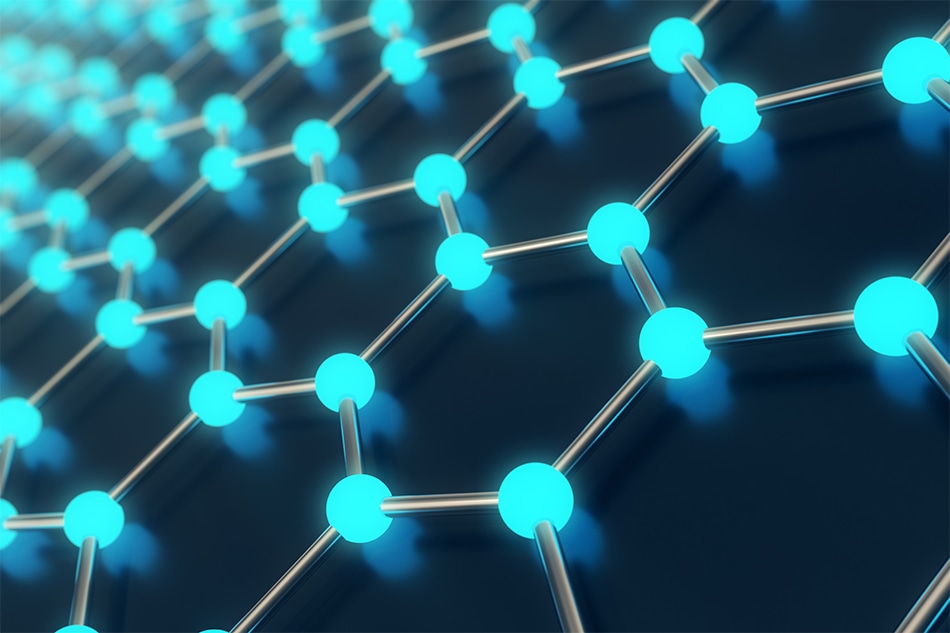
Graphene-based membranes which act like super-fine sieves could economically transform the nuclear industry by reducing the energy costs associated with producing heavy water meaning greener and cheaper nuclear power.
Heavy water – or deuterium oxide, D2O – is a form of water containing a larger than normal amount of deuterium, an isotope of hydrogen. Deuterium is only present in nature in very small amounts: for every 6,420 hydrogen atoms, there is just one atom of deuterium. The deuterium gives the chemical different nuclear properties, and the increased mass gives it different physical and chemical properties compared to normal water. This makes heavy water useful as a special coolant and moderator of neutrons in nuclear power plants, but increasing the concentration of deuterium to make it is energy intensive and expensive.
Separating hydrogen isotopes is a huge chore for nuclear fission and future fusion plants. Thousands of tons of isotopic mixtures are processed each year, with just 1kg of heavy water consuming enough energy to power the average American household for a year.
However, graphene membranes could change this, reducing the energy cost of producing heavy water and decontamination in nuclear power plants by over 100 times compared with current technologies. It could also reduce the CO2 emissions associated with heavy water production by up to a million tonnes a year.
A team from the University of Manchester have demonstrated fully scalable prototypes of graphene membranes capable of producing heavy water. Graphene’s unique material properties mean it has the potential to effectively separate sub-atomic particles, making the process more efficient and cost effective.
“This is a crucial milestone in the path to taking this revolutionary technology to industrial application,” said Dr Marcelo Lozada-Hidalgo, research fellow and leader of the study published in Nature Communications. “The potential gains are high enough to justify its introduction even in the highly conservative nuclear industry.”
The team discovered only last year that graphene can efficiently sieve hydrogen isotopes, believing that it could be used to create the expensive heavy water needed by the nuclear industry. However, the industrial opportunities were not analysed as there were no membranes or fabrication method suitable for scalable manufacturing at the time. Now they have developed fully scalable prototype membranes and demonstrated isotope separation in pilot scale studies.
To create the membrane, the researchers first took a Nafion film - sulfonated tetrafluoroethylene based fluoropolymer-copolymer - and attached it to a carbon cloth. Next, a copper foil with carbon vapour deposition (CVD)-grown graphene was hot pressed against the Nafion; the copper was subsequently etched away to release the CVD graphene onto the Nafion.
They then used electron-beam evaporation to decorate graphene with palladium nanoparticles, which act as a catalyst to increase graphene’s hydrogen isotope transparency. Finally, the graphene was covered with another carbon cloth, both to prevent its accidental damage and to electrically contact graphene over the entire area, before undergoing microscopic examination and testing.
The researchers found that the high efficiency of the separation would allow for a significant reduction of the input amount of raw isotope mixtures that needs to be processed. This would reduce both the capital costs and the energy requirements.
They estimated over one hundred times less energy would be required to produce heavy water compared to competing technologies, with even larger energy savings anticipated for tritium decontamination. Nuclear waste is contaminated with radioactive tritium - another hydrogen isotope – and it too can be separated by the graphene filter. Furthermore, there are no environmental issues because no toxic and corrosive substances are involved.
Sir Andre Geim, who won the 2010 Nobel Prize in Physics with Konstantin Novoselov for their work with graphene added: “Tritium discharged both from nuclear power plants and as a result of environmental disasters is a major global concern. We believe this technology can economically transform the environmental footprint of future nuclear plants.”
The team believe there because there are no fundamental obstacles for scaling up, the technology’s simplicity, efficiency and green credentials call for consideration by the nuclear and related industries.
Source: University of Manchester
Image Credit: Shutterstock.com/Rost9
Disclaimer: The views expressed here are those of the author expressed in their private capacity and do not necessarily represent the views of AZoM.com Limited T/A AZoNetwork the owner and operator of this website. This disclaimer forms part of the Terms and conditions of use of this website.